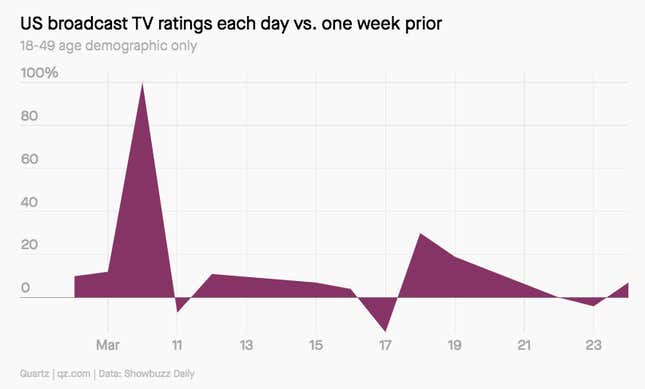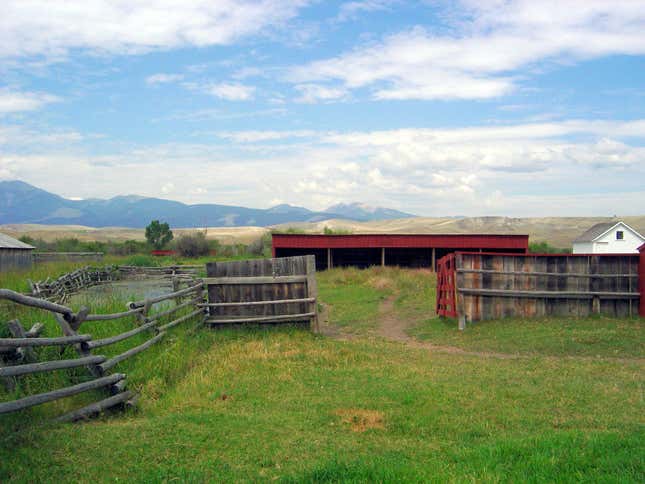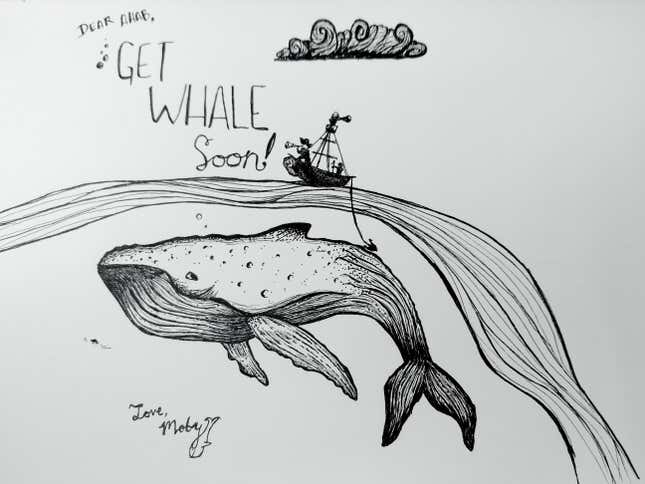Hello Quartz readers,
Earlier this week, Quartz Africa editor Yinka Adegoke shared an observation about the global nature of pandemics. “I’m getting messages from friends in London, Madrid, Lagos, and other places, who are reading news reports and asking if we’re okay because we’re in New York,” he said. “But I’m thinking the same about them. It’s something about the psychology of fear, and how we transfer it onto others.”
It’s interesting how a pandemic both cements and renders moot our physical distance from one another. Friends in New York and London, Lagos and Madrid, can be stuck thousands of miles apart, but are going through variations of the same experience. The fear is global, but so is the community. It’s an unfortunate but not entirely unpleasant camaraderie, like being trapped in a broken elevator with the whole planet.
In this little corner of the elevator, we’re becoming obsessed with your emails. There are enough reader recipes that we considered opening a (delivery-by-robot) Quartzantine Cafe, but instead we’ll share a bunch of them soon. If you’ve still got a recipe to impart, ✉️ send it over.
Here’s what else you’re up to:
- “Zoom. Loving Zoom. Zooming with everybody,” writes Debbie M. “Calling friends I haven’t spoken to in awhile. Long hikes in a nearby state park. Baking, cooking, and eating with more thoughtfulness. Finally tackling my ‘rest-of-my-life’ to do list, and finding a lot of things on that list are no longer of interest.”
- “If you are feeling depressed, do something crafty,” advises Marie M. “It’s known to lift depression and calm anxiety. It really works. I make handmade cards, water paint, and sometimes use an adult coloring book.”
- “Cooking is my thing,” says Elaine F. “Last thing I will give up when getting sick and the first thing I will start doing when I get better. Find whatever is at the bottom of your freezer that you’ve been ignoring. Look up a recipe and go at it. Substitutions are allowed.”
- To celebrate her birthday (🎉) in lockdown, Yvonne T. enjoyed short ribs, mashed potatoes with Boursin cheese, cauliflower, and chocolate cupcakes with cream cheese icing for dessert. Who needs to go anywhere with meals like that?
Thank you for all your notes, and please keep reaching out. Today we’re wondering:
✉️ Has your “rest-of-my-life” to do list changed?
✉️ Really though, send recipes.
Okay, let’s get started.
When you just need space
If you’re feeling the strain of self-isolation, try to keep things in perspective. In wealthy countries, social distancing is a choice most people can make. In the rest of the world, the concept is an unimaginable luxury.
People who live in the low- or middle-income neighborhoods of Africa or Asia’s large cities, or those who live in the slums of Latin America and depend on the informal economy, often share overcrowded quarters, and don’t have a realistic option to stay two meters (six feet) apart. Their strained, already precarious healthcare resources won’t stand a chance under the weight of a pandemic that’s already crushing the world’s strongest health systems.
New York City has already shown the impact of high population density on the spread of the virus. But its concentration is nothing compared to Manila, where over four times as many people share the same amount of space; Dhaka, where three times as many do; or Nairobi’s Kibera, Africa’s largest slum, which with 300,000 people per square kilometer has nearly 30 times the density of America’s most crowded city.
As India begins a 14-day lockdown, migrant workers have been leaving its major cities to walk back to their villages. For many, the journey will take days, and when they finally get home, such workers are unlikely to have the physical space to quarantine themselves. Still, they are the lucky ones: For the poorest of the world, this epidemic will be yet another catastrophe against which the global order failed to protect them.
There is little we can do to stop the spread of Covid-19 in the world’s most vulnerable communities. But there is something we can do to prevent the next one: As experts repeated after Ebola, and after Zika, our best precaution against pandemic is strengthening the global south’s health systems. Having space, we are about to discover, is just another way in which inequality manifests itself.
Globetrotting
🇧🇪 Belgium
“Essential” is in the eye of the beholder. In Belgium, access to frites (french fries) is critical, thus kiosks devoted to fry distribution remain open. France considers wine and fine food essential; the Netherlands and several US states feel the same about cannabis. And in Germany, France, and Belgium, booksellers are considered indispensable.
🇭🇰 Hong Kong
Hong Kong is geofencing some under quarantine. Airport arrivals are given a wristband whose unique QR code pairs with an app called StayHomeSafe. The app uses the signals of the user’s home—wifi networks, Bluetooth, and cellular networks—to create a “composite signature” of the space, and notifies the government if the user tries to go outside it.
🇬🇧 United Kingdom
The UK led the world in online grocery delivery—until coronavirus. “The amount of demand is simply unprecedented,” the CFO of British online grocer Ocado told investors this month, likening the surge in website traffic to a “denial-of-service attack.” In newly locked-down India, online grocers are already struggling to stay operational.
🇮🇳 India
Indians came out in droves to celebrate a call for social distancing. On March 19, prime minister Narendra Modi asked Indians to gather at their balconies and windows at 5pm to show support for healthcare workers by clapping, clanging metal vessels, or ringing bells. Unfortunately, many people—including some senior government officials—did their clapping and clanging in large groups in the streets.
🇺🇸 United States
Americans are watching broadcast TV again. Ratings for the four major US networks—ABC, NBC, Fox, and CBS—have increased each week since March 1; even the 18- to 49-year-old demographic is watching. The pandemic has been especially good to reality TV, medical dramas, and shows about first responders.

🇷🇺 Russia
Russia reports few coronavirus cases, but a sharp spike in “pneumonia.” “[It seems] the strange spike in pneumonia cases is really just Covid by another name,” says Mark Galeotti, a senior associate fellow at the Royal United Services Institute, a think tank in London. “Let’s face it, the Russians have a long habit of understating crises.”
🇮🇹 Italy
Religions are embracing live-streaming and conference calls. With churches in Italy unable to host services, Sofia Abasolo recently dressed up her two sons, aged two and three, and watched a service streamed live from the Vatican. “Obviously the kids were going wild,” she says. In part because they thought she said “ice cream,” not “livestream.”
🇳🇬 Nigeria
Pressure is building to halt the pangolin trade. Since scientists learned the novel coronavirus might have spread to humans through pangolins in a Wuhan wildlife market, Chinese authorities have closed or put under quarantine about 20,000 wildlife farms. Vietnam is considering similar measures, and conservationists are pushing pangolin trade hub Nigeria to follow suit. Says WildAid CEO Peter Knights, “the coronavirus outbreak has finally made us recognize that conservation is a public health issue.”
For Quartz members
Give in to that 7-day free trial!
🇮🇹 Italy is key to China’s coronavirus propaganda efforts.
💻 We all need a guide to keeping remote teams connected.
🎥 US-China tensions threaten scientific progress.
💸 Coronavirus could change how startups get funded.
🎨 Did you know quarantine can make you more creative?
When nature calls. Astronaut Scott Kelly wrote that while confined in the International Space Station, he listened to recordings of Earth sounds on repeat. If you’re looking for similar sonic therapy, try this (free!) recording of chirping birds at the Grant-Kohrs Ranch in Montana, taken by Quartz Things reporter Daniel Wolfe. Quartz members can also enjoy a library of other sounds from US National Parks.
✉️ Are you listening to any ambient noise?

Essential reading
- The latest 🌏 figures: 511,603 confirmed cases; 120,996 classified as “recovered.”
- First-person responder: What it’s like to treat the coronavirus.
- Bride and Zoom: When your friends get married via videoconference.
- Rising off the shelves: Active dry yeast is making everyone’s shopping list.
- Green lining: Because of Covid-19, the US may pass a major climate bill.
- Retail therapy: Is it ethical to order deliveries right now?
- Well that’s nice: New York City is running low on adoptable dogs.
PS: This week’s award for most thoughtful reader email goes to Tiffany H., who drew a card for anyone at Quartz who might be sick. May it brighten your day as much as it did ours.

Our best wishes for a healthy day. Get in touch with us at needtoknow@qz.com, and live your best Quartz life by downloading our app and becoming a member. Today’s newsletter was brought to you by, well, the entire Quartz newsroom.